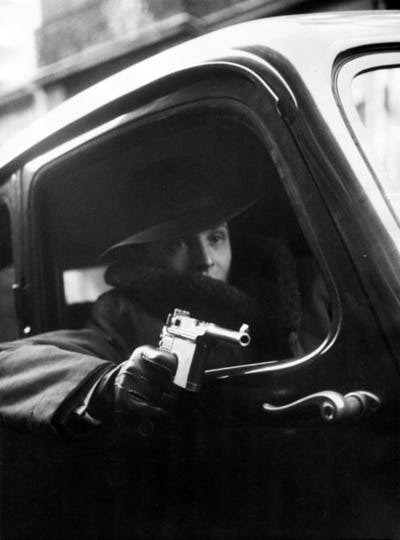Noir: Revisited and Reimagined

Now that I’m back into the swing of noir, I’ve been revisiting some of my past essays on the art of this wonderful, seedy, stylish, dark, and darkly funny genre. I think it was Otto Penzler who said, “Noir requires a sense of bleakness and despair, and characters so flawed, their failure is in their DNA.”
I love that. Wish I’d said it.
Apparently, I have said other things, though. For instance, in an essay from way back in 2013, I took note of Raymond Chandler’s style: “His characters were funny,” I wrote. “They were wry, off-kilter, even pathetic. A conspicuous longing punctuated their wisecracks instead of the usual punch line; he used the screech of a tire in place of a pa-dum-pum. I mean really, is there a better comic line than, ‘From thirty feet away she looked like a lot of class. From ten feet away she looked like something made up to be seen from thirty feet away?’ Taken out of context, that’s a line that could have just as easily come out of Saturday Night Live.”
I stand by that, even if I have absolutely no memory of writing it.
One of the interesting things about being a long-time writer who has gotten a lot of thoughts and words down on the page is that you honest-to-God forget what you’ve written. As I’ve been rereading some of my fiction and general thoughts on the craft of the noir thriller – like the Raymond Chandler observation above – I feel as if I’m taking it all in for the first time, and that it could’ve – almost – been written by someone else. There are times I’m pleased as punch about a quip, interpretation, or description. On other occasions I see a sentence trying too hard, a mixed metaphor, an attempted elucidation that only manages to muddle or misses the mark entirely.
Naturally, I’m not the only writer who experiences this. It’s a common phenomenon, I’m told, and one that’s baked into the byzantine experience of diving into a fantasy set of circumstances, building a world around those happenings, and getting to know the motley crew of characters that populate that world. “People” who take on a life of their own that often seems to have only a passing resemblance to the one we gave them. Or thought we gave them.
 Didn’t see this coming.
Didn’t see this coming.It was Falkner who said, “It begins with a character, all I can do is trot along behind him trying to put down what he says and does.” If you’re not a fiction writer, it’s probably hard to imagine just how spot on is Falkner’s description of the process. Seems as counterintuitive, perhaps, as forgetting your own damned prose. Aren’t writers the gods and masters of their work, and don’t they feel a familiarity with their words that’s on par with the one that’s innate between a mother and child?
As a mother myself, I’d have to say – not exactly. The following around part definitely sounds familiar, but I can say without hesitation that I would never forget a child I created and nurtured. Yet, despite how much blood, sweat, and tears I’ve put into my stories, I feel a genuine sense of novelty each time I sit down to re-read one of my books. The reason I have to reread them in the first place is because I need to make sure that the next book in the series matches the previous ones in both continuity and tone. I actually take notes, even when I’m reading one of my finished novels for the third or fourth time.
Maybe that loss of creative memory is what keeps a writer fresh. A style, after all, is a combination of taste, interest, experience, and what a writer has to say about all of those things at a given moment in time, during a specific sequence of events. If you’re doing it right, you see something new each time you sit down to your story and the people you’ve placed into it.
There’s never any guarantee that the creative muse will deliver. And when she does show up, it’s anyone’s guess as to whether her input will be any good. Sometimes our muses offer interesting ideas that just don’t fit, that are too weird, maybe too clever for their own good. Or just plain meh.
Muses are fickle that way.
But after all the elements have been culled, and we’ve put in the time, the creative muscle, the reflection, the vision, and the fantasy, we have the raw materials for something that might just come together. When a scribe finally finishes her story, hopefully there will be enough of the original to make it interesting, but not so much as to make the story unrelatable. It’s a fine line.
One I hope I’m walking with the grace and panache of this broad. But you be the judge.

Bombay, India 1959
A hard rain came out of nowhere, and Magdalena jogged to a peepal tree, huddling under its large, heart-shaped leaves. Unlike her, Fedot didn’t quicken his step. He walked in a deliberate fashion up the mossy, slate pathway to the house, opened the front door, and disappeared inside.
Magdalena ran right after him, becoming soaked to the skin in just the short way from the shelter of her tree to the entry of the old house. To her relief, and frankly, surprise, the place remained unlocked, and she was able to go right in.
The door opened to a time-worn marble foyer with wrought iron flourishes. Identical Roman pedestals made of pock-marked stone flanked a pair of glass French doors leading into a passageway. They creaked just a bit when she opened them, and Magdalena cursed under her breath. Removing her shoes, she stepped barefoot into the passage, not making a sound this time.
Standing there, eyes closed, she listened until she picked up a voice speaking barely above a whisper – Fedot’s. It made her heart pound, though she couldn’t really say why. Fedot was sly and evasive, like all spies, but she’d never felt like she was in any particular danger around him. Of course, she’d never stalked him in the pre-dawn hours before, going to places that maybe he didn’t want her to see. With trembling hands and goose-pimpled skin, she followed Fedot’s voice up a back staircase, its walls flecked with age-old grime and fingerprints.
It was surprisingly cool and dry in the house, despite the rain and humidity outside. She imagined that smart old houses like this one were built to withstand monsoon season, so a single morning rain was nothing. Upstairs, once she entered the hallway, things were far less dry. In fact, the walls were sweating quite a bit and now so was she. Magdalena almost felt as if she was standing outside. The reason for this was obvious once she got closer to the two bedrooms at the far back of the home. Those had open terraces, covered but intruded upon by the garden trees that stretched out behind the house. Lovely, wild, thick with leaves.
Fedot’s voice had fallen off, but she knew where it had come from and veered to the left, into a room lit by lanterns that cast luxurious light onto the perfect mosaic tiles. A large bed sat at the center of the room, covered in an explosively beautiful silk quilt that looked to be sewn of the finest saris. It seemed like an heirloom a mother would give her daughter, one made of her ancestors’ wedding dresses perhaps.
Fedot was sitting on the bed, leaning over someone who looked half dead. There was a distinctive smell of vomit in the room somewhat masked by the thick air of flora, but not enough.
“My God, Fedot,” she said. “Is that who I think it is?”
 Victoria’s Amazon Page
Victoria’s Amazon Page



